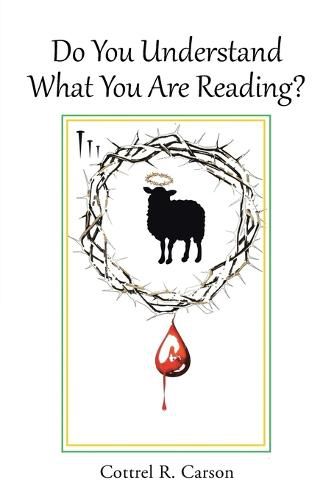Readings Newsletter
Become a Readings Member to make your shopping experience even easier.
Sign in or sign up for free!
You’re not far away from qualifying for FREE standard shipping within Australia
You’ve qualified for FREE standard shipping within Australia
The cart is loading…






This title is printed to order. This book may have been self-published. If so, we cannot guarantee the quality of the content. In the main most books will have gone through the editing process however some may not. We therefore suggest that you be aware of this before ordering this book. If in doubt check either the author or publisher’s details as we are unable to accept any returns unless they are faulty. Please contact us if you have any questions.
Do You Understand What You Are Reading? is an attempt to read the Ethiopian eunuch story in the historical, grammatical, and cultural contexts presented within the narrative of Acts. Soon after Luke wrote Acts, which is the only New Testament book of history, interpreters (Church Fathers) began wrestling with the moral-Promise-worldview it contained. Many, not all, signified upon the Ethiopian character in ways that expressed disdain for Imperial eunuchs who were their contemporaries. It was a time of transformation in Western culture.
As Rome attracted the best and brightest from all cultures, positions held by Imperial eunuchs were coveted; they were national bureaucrats, priests, and confidants to monarchs. Roman emperor Domitian (81-96) issued an edict banning making eunuchs, while maintaining his own eunuch, Stephanus. Domitian was murdered by courtiers and castrated. Roman emperor Constantine (306-337) issued another edict banning making eunuchs. The social climate became extremely hostile for high-ranking eunuchs as they were attacked in public culture-theater, music, poetry (spoken, written and sung).
In 399, Eutropius-a eunuch, the first and only eunuch Consul in the Eastern Roman Empire-was murdered by his own troops. The Syrian poet Claudian wrote and published a political invective attacking him, which focused social hostility toward him. He ran to Church Father John Chrysostom’s church. Eutropius had placed Chrysostom over his bishopric. Eutropius stayed at the altar for three days after Chrysostom closed the sanctuary. On the third day, he emerged and was promptly killed. Afterward, a general slaughter of eunuchs occurred throughout the Western empire; although, they may still be found in the east (e.g. Hijras).
In the midst of tectonic shifts in Greco-Roman society, in Acts, Luke engages Greco-Roman culture on behalf of Promise. His audience includes Imperial eunuchs, whose salvation prophets Isaiah and Jeremiah had foretold, and who were Luke’s contemporaries.
1
$9.00 standard shipping within Australia
FREE standard shipping within Australia for orders over $100.00
Express & International shipping calculated at checkout
This title is printed to order. This book may have been self-published. If so, we cannot guarantee the quality of the content. In the main most books will have gone through the editing process however some may not. We therefore suggest that you be aware of this before ordering this book. If in doubt check either the author or publisher’s details as we are unable to accept any returns unless they are faulty. Please contact us if you have any questions.
Do You Understand What You Are Reading? is an attempt to read the Ethiopian eunuch story in the historical, grammatical, and cultural contexts presented within the narrative of Acts. Soon after Luke wrote Acts, which is the only New Testament book of history, interpreters (Church Fathers) began wrestling with the moral-Promise-worldview it contained. Many, not all, signified upon the Ethiopian character in ways that expressed disdain for Imperial eunuchs who were their contemporaries. It was a time of transformation in Western culture.
As Rome attracted the best and brightest from all cultures, positions held by Imperial eunuchs were coveted; they were national bureaucrats, priests, and confidants to monarchs. Roman emperor Domitian (81-96) issued an edict banning making eunuchs, while maintaining his own eunuch, Stephanus. Domitian was murdered by courtiers and castrated. Roman emperor Constantine (306-337) issued another edict banning making eunuchs. The social climate became extremely hostile for high-ranking eunuchs as they were attacked in public culture-theater, music, poetry (spoken, written and sung).
In 399, Eutropius-a eunuch, the first and only eunuch Consul in the Eastern Roman Empire-was murdered by his own troops. The Syrian poet Claudian wrote and published a political invective attacking him, which focused social hostility toward him. He ran to Church Father John Chrysostom’s church. Eutropius had placed Chrysostom over his bishopric. Eutropius stayed at the altar for three days after Chrysostom closed the sanctuary. On the third day, he emerged and was promptly killed. Afterward, a general slaughter of eunuchs occurred throughout the Western empire; although, they may still be found in the east (e.g. Hijras).
In the midst of tectonic shifts in Greco-Roman society, in Acts, Luke engages Greco-Roman culture on behalf of Promise. His audience includes Imperial eunuchs, whose salvation prophets Isaiah and Jeremiah had foretold, and who were Luke’s contemporaries.
1